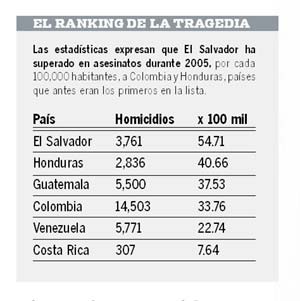El Salvador's pain -- murder rate highest in Latin America
The statistics on the homicide rate in El Salvador in 2005 compared with the rest of Latin America are truly shocking. As reported today by La Prensa Grafica, the country's murder rate of 54 murders per 100,000 in population is by far the highest in Latin America. No other country has a rate higher than 40 per 100,000:

The causes are many -- gangs, poverty, the proliferation of guns, an ineffective court system, organized crime, family violence, and more -- and the solutions are elusive. The only thing which is clear is that this tragic situation requires efforts at all levels of society from the government, to the churches, to the schools, to the media, to business and community leaders.
The auxiliary bishop of San Salvador, Gregorio Rosa Chavez, declared today, that to solve the problem of the violence in El Salvador it will be necessary "to depoliticize it" and to see it in more global terms. "Laws we have enough, but there is not a culture of respect for the law, and when the approach in the law is repressive, it is a sign of weakness, a sign that that the law does not respect the person, that our laws do not show a belief that we are a rational people", the bishop said, in a press conference in the Metropolitan Cathedral. He added that "it is necessary to de-dramatize the subject and to de-politicize it, that is to say, to see it in more global terms, and to search for the types of politicians and types of policies we need to come out ahead".
Meanwhile Salvadoran president Tony Saca has presented a new initiative to the Legislative Assembly to "reform" the criminal laws to strengthen the sanctions against those who commit the crimes of extortion or kidnapping.

The causes are many -- gangs, poverty, the proliferation of guns, an ineffective court system, organized crime, family violence, and more -- and the solutions are elusive. The only thing which is clear is that this tragic situation requires efforts at all levels of society from the government, to the churches, to the schools, to the media, to business and community leaders.
The auxiliary bishop of San Salvador, Gregorio Rosa Chavez, declared today, that to solve the problem of the violence in El Salvador it will be necessary "to depoliticize it" and to see it in more global terms. "Laws we have enough, but there is not a culture of respect for the law, and when the approach in the law is repressive, it is a sign of weakness, a sign that that the law does not respect the person, that our laws do not show a belief that we are a rational people", the bishop said, in a press conference in the Metropolitan Cathedral. He added that "it is necessary to de-dramatize the subject and to de-politicize it, that is to say, to see it in more global terms, and to search for the types of politicians and types of policies we need to come out ahead".
Meanwhile Salvadoran president Tony Saca has presented a new initiative to the Legislative Assembly to "reform" the criminal laws to strengthen the sanctions against those who commit the crimes of extortion or kidnapping.
Comments
His comments criticizing the government’s repressive response are fine, but vague (perhaps he is vague to avoid looking political). However, what are needed are not vague accusations but good social science, specific policy proposals, and healthy debate. Having family who experienced government repression in the 1980’s, I am disposed to believe accusations of government repression today. However, it strikes me that no one seems to be making any efforts to document this repression.
One gets the impression from an earlier article cited in Tim’s blog that people like Matt Eisen and Antonio Rodriguez are encountering police repression on a daily basis. Maybe we should send these guys a video camera.
Notice that Nicaragua is not listed in the murder statistics. Nicaragua has much lower crime rate despite similar history and worse poverty compared to El Salvador. Has anyone seriously looked into the causes of this?
There's no way that Honduras has a lower murder rate than El Salvador anyway. The murder statistics constantly released for the country (which seem to fall anywhere between 30 and 60 per 100,000) fail to reflect the appalling mass killings in the city of San Pedro Sula.
It has the biggest mass shooting by a street gang I've ever seen (28 - compared to the 2nd placed Colombian city of Medellin with 16) yet the murder rate is lower than Rio de Janeiro's average...who's biggest street gang murder is a body count of 12.
There's been other mass shootings as well in San Pedro Sula but I don't know if it's street gangs or organized crime. A gun massacre of 28 by a youth gang suggests a far higher murder rate than 40 per 100,000 in a small nation of 7 million.
Aside from that, Colombia had over 18,000 homicides in 2005 though it has dropped significantly, and I'm pretty sure Brazil should be on that list as it had a striking 28 to 30 murders per 100,000 as recently as 2002 across a nation of 175 million.
weird, isn't it?